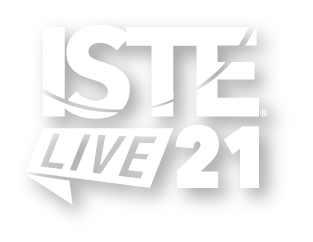

Design Analog Experiences with Emerging Technologies |
Explore and create : Creation lab
Ariam Mogos
In this hands-on session, participants will engage with the learning arc of REP magazine, an analog magazine which immerses k12 educators and students in emerging tech. Participants will experience the REP arc, and create a new learning experience for their students around an emerging technology.
| Audience: | Curriculum/district specialists, Library media specialists, Teachers |
| Skill level: | Beginner |
| Attendee devices: | Devices useful |
| Attendee device specification: | Laptop: Chromebook, Mac, PC |
| Participant accounts, software and other materials: | Zoom Mural |
| Topic: | Emergent technologies |
| Grade level: | 6-12 |
| Subject area: | Computer science, STEM/STEAM |
| ISTE Standards: | For Students: Digital Citizen
|
In this hands-on session, participants will engage with REP magazine, an analog print-based series which immerses k12 educators and students in emerging technologies through project-based activities. Each REP issue helps young people understand and teach the foundational concepts of an emerging technology (blockchain, synthetic biology, machine learning, etc.), wrestle with the implications of the emerging technology, remix original collage art and build with the emerging technology to address issues relevant to your community.
In this session we will play with the first issue of REP that is focused on voice bots like Alexa and Siri. Then we will work together to design a new issue of REP focused on domed cities or towns (or an alternative emerging technology). Participants will walk away with creative ways in which they can teach young people to be the designers of justice-focused emerging tech, having become designers themselves. This session will not be technical, but it will explore technical concepts and requires curiosity and an appetite to learn.
(5 min) Introductions and Framing of session: Overview of REP Magazine Goals.
(5 min) Stoke: Icebreaker (peer-to-peer engagement)
(10 min) Voice is Entertainment: Participants will experience voice bots through pop culture references to gain familiarity with voice design.
(15 min) Deconstructing voice bots through experience design: Participants will deconstruct how we communicate with voice bots, the different experiences they create for us and design their own original lines and data for a voice bot.
(5 min) Refresh Stretch: Participants will take five minutes to stretch and grab a glass of water.
(10 min) Stoke: Domed cities and towns (explore the concepts).
(30 min) Rep Design Work: Imagine domed cities in the world: Participants will work in teams to rapidly design a short activity focused on domed cities and how they could operate in the world, using the REP learning arc. Participants will also explore resources that help them understand domed cities more deeply and inequities that could exist in the creation of these emerging technologies.
(10 min) Gallery Walk Critique: Participants will receive constructive feedback for other teams in a digital gallery walk of activities.
(10 min) Debrief: Participants will debrief with facilitators on the session and their experience through visible thinking tools (“I Used to Think..., But Now I Believe”, Human Barometer, etc.).
Ruha Benjamin spoke on this topic at ISTE 2016:
https://www.youtube.com/watch?v=9xmrJJESCt8
Safiya Noble in Edweek illustrates the important of this issue:
https://www.edweek.org/teaching-learning/schools-shouldnt-trust-google-search-because-it-reinforces-racism-researcher-argues/2018/05

Ariam Mogos is a futurist fellow in the Stanford d.school K12 Lab, where she designs prototypes with K-12 educators around how to engage, evaluate, and create with emerging technologies, grounded in ethics and digital agency. A constructivist educator passionate about computing, Ariam has worked at the intersection of education, technology, equity and play in the United States, Asia, Africa and Europe. Prior to the d.school, she was the Learning Lead for UNICEF’s Office of Innovation, and has also worked on education technology initiatives with the World Bank, LEGO Foundation, the Kenyan government, the U. S. Department of State and Global Kids.
Creating Artifacts of Learning Through Moviemaking
Playful and Deeper Learning Through Designing Board Games
Writers Revel In Identifying Their Excellence: Technology-Enhanced Genius Hour & Writing Workshop